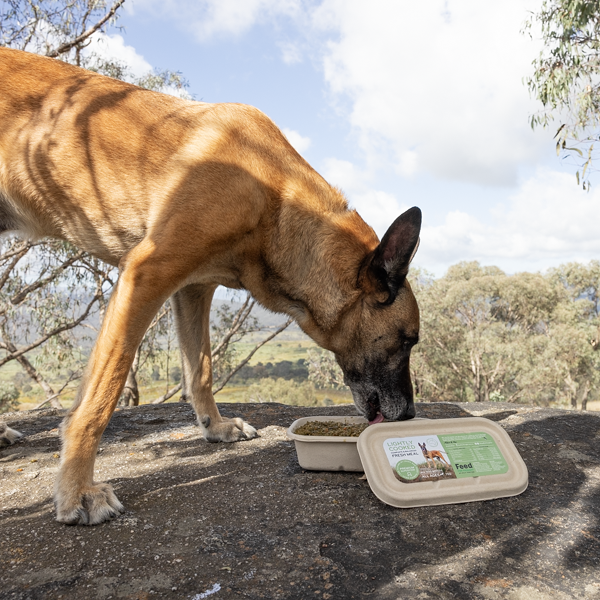If your dog is scratching more than usual or their stomach seems upset after meals, you may be wondering if their food is part of the problem. Food sensitivities in dogs are becoming more common, and finding a diet that works can sometimes feel like solving a puzzle. For dogs with sensitive stomachs or suspected allergies, hypoallergenic protein sources such as insect protein are emerging as a promising alternative.
What Is Hypoallergenic Protein and Why Does It Matter?
Hypoallergenic protein sources are less likely to trigger immune or allergic reactions. In dogs, common protein allergens include beef, chicken, dairy, and lamb. These can cause itching, red or inflamed skin, ear infections, vomiting, or diarrhoea (1).
Because insect protein is a novel protein, meaning it is unlikely to have been encountered before, the immune system is less likely to have been sensitised to it. This lowers the risk of a reaction and provides a valuable alternative for dogs suffering from chronic sensitivities (2).
In one published case report, a dog with known food allergies was switched to a diet containing black soldier fly larvae (BSFL) insect meal. The dog’s gastrointestinal and dermatologic symptoms improved, and no allergic reactions to the insect protein were recorded (3).
It is important to note that “hypoallergenic” does not mean completely allergen-free. Some studies have shown that dogs allergic to storage mites could display mild cross-reactivity with certain insect proteins such as mealworm, though this appears rare (4). Even so, insect protein remains one of the most promising options for dogs with food-related sensitivities.
Understanding the Nutritional Benefits of Insect Protein
Hypoallergenic is only one part of the story. A truly healthy protein source must also deliver complete and balanced nutrition.
Insects such as the black soldier fly or yellow mealworm are naturally rich in protein, essential amino acids, and beneficial fats. Research shows that insect protein content typically ranges from 35 to 60 percent (dry weight), often higher than plant-based proteins(5). These amino acids support muscle maintenance, immune health, and healthy skin.
Insect proteins are also highly digestible, meaning they are easy on sensitive stomachs. Controlled feeding studies have found positive faecal scores and nutrient absorption comparable to traditional protein sources, even when insect meal made up a significant portion of the diet (6).
In addition to protein, insect meals provide beneficial fatty acids such as lauric acid and antimicrobial peptides that may support a healthy gut microbiome and help reduce inflammation (7).
In one formulation study using yellow mealworm meal, researchers found that including up to 45 percent insect meal in dry dog food maintained protein quality, improved unsaturated fat content, and preserved essential amino acid balance (8).
These findings show that insect protein can be both hypoallergenic and nutritionally robust, supporting digestion, coat condition, and skin health for sensitive dogs.
A Sustainable Choice for Health-Conscious Pet Parents
While the focus here is on your dog’s health, insect protein also offers major sustainability benefits.
Traditional meat production requires significant land, water, and feed resources, and contributes heavily to greenhouse gas emissions. Insects, by contrast, are resource-efficient. They can be raised using organic waste streams and require a fraction of the inputs needed to produce equivalent amounts of protein (9).
For eco-conscious dog owners, this means insect-based diets align with a lower-impact lifestyle, helping to reduce the environmental footprint of pet ownership without compromising on quality or nutrition.
Is Insect Protein Right for Your Dog?
It is natural to wonder whether insect protein is the right choice for your pet. For many dogs with allergies or sensitive stomachs, switching to an insect-based diet can provide relief from chronic symptoms.
Dogs that have not responded well to limited-ingredient or other novel-protein diets, such as venison or duck, may benefit from the nutrient balance and digestibility of insect protein. Studies show that most dogs tolerate insect-based foods well, with positive energy levels, normal stool consistency, and improvements in coat and skin condition (10).
As with any dietary change, introduce insect-based food gradually over 7–10 days to allow the digestive system to adjust.
If you are unsure, consult your veterinarian or a veterinary nutritionist. They can help design a diet trial and monitor your dog’s response to the change.
The Bottom Line
Insect protein offers a balanced, gentle, and nutrient-dense alternative for dogs with food sensitivities. It delivers complete nutrition, supports skin and gut health, and offers a truly sustainable solution for health-conscious pet parents.
If your dog is battling chronic itching, ear irritation, or digestive discomfort, insect-based food may provide the relief they need. By choosing a high-quality, vet-formulated insect protein diet, you are supporting both your dog’s health and the planet.
At Feed For Thought, we believe the best dog food balances science, sustainability, and sensitivity. Every bowl is designed to nourish your dog, protect the planet, and give peace of mind to owners who simply want the best for their companions.
— Alison Gordon, Founder and CEO, Feed For Thought
References
-
Stella & Chewy’s. Allergy-Friendly Novel Protein Diets. 2024.
-
DVM360. The Buzz on Insect-Based Diets: A New Hypoallergenic Protein Source. 2024.
-
Braeckman, K., et al. Case Report: Black Soldier Fly Larvae as a Novel Protein Source for a Food-Allergic Dog. Animals (Basel). 2024; 14(19):2859.
-
Broekman, H., et al. Cross-reactivity of IgE from Dogs Allergic to Storage Mites with Mealworm Proteins. Animals (Basel). 2021; 11(7):1942.
-
DVM360. The Buzz on Insect-Based Diets. 2024.
-
Bosch, G., et al. Nutritional Evaluation of Insect Proteins for Dogs and Cats. Journal of Animal Science. 2022.
-
Jiminy’s. Research Roundup: Key Studies on Insect Protein for Dogs. 2024.
-
Papini, S., et al. Nutritional Properties of Mealworm in Canine Diet Formulations. Preprints.org. 2025.
-
AHVMA Journal. Sustainable Pet Nutrition: The Environmental Case for Insect Protein. 2023.
-
Pet Science Daily. Sustainable Insect Protein Diet Keeps Dogs Healthy and Happy. 2025.
-
Ella.co. Why Are Novel Proteins Good for Sensitive Dogs? 2024.
